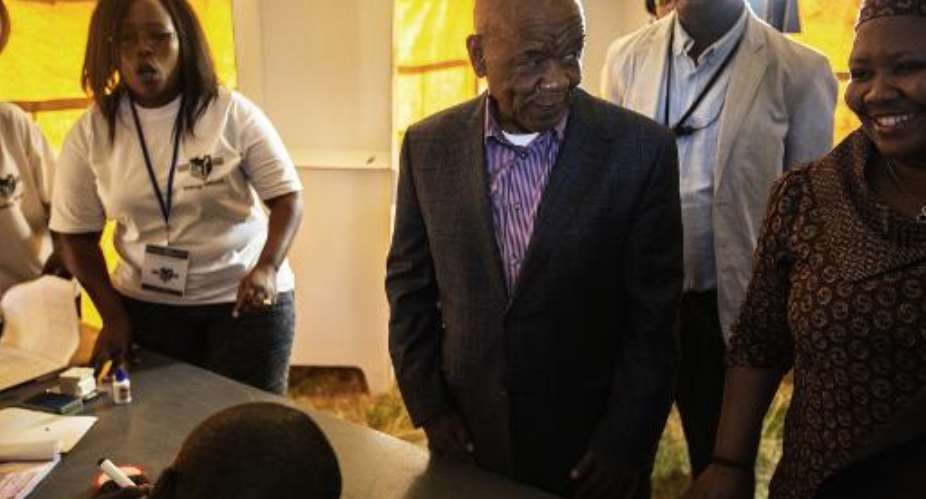Maseru (Lesotho) (AFP) - The results of Lesotho's snap election following an alleged coup attempt last year trickled in slowly Sunday, with Prime Minister Thomas Thabane taking an early lead with a quarter of the vote tallied.
Saturday's parliamentary poll, which was called two years ahead of schedule, passed without incident according to observers.
But hampered by manual counting and Lesotho's mountainous terrain, the results were slow to come in Sunday.
The small mountain kingdom has been in crisis since June 2014, when Thabane suspended parliament to avoid a motion that would have seen him ousted from power after his fragile coalition government fell apart.
On August 30, soldiers attacked police headquarters, looting weapons and killing one officer.
Thabane described the violence as a coup attempt fuelled by the opposition and fled to neighbouring South Africa.
Both the military and opposition denied any bid to seize power.
Observers from both regional bloc the Southern African Development Community (SADC) and the African Union have been monitoring the election, and 475 police from neighbouring countries have been deployed to keep the peace.
The army was confined to barracks during Saturday's vote.
By 1400 GMT Sunday, only 19 of the 80 constituencies up for grabs had been officially declared by the Independent Electoral Commission (IEC).
Thabane's All Basotho Convention, however, took an early lead with 16 seats.
The Democratic Congress, led by former Prime Minister Pakalitha Mosisili, held three.
Lesotho has a mixed parliamentary system. Eighty lawmakers are voted into power by their constituents, while another 40 seats are distributed proportionally after the final results to ensure all parties are represented in parliament.
A party needs 61 of the 120 seats available to rule without being forced into a coalition.
Before the vote, analysts warned that an outright win by a single party could result in violence -- particularly if the winner was the prime minister's All Basotho Convention party (ABC).
But the capital Maseru remained quiet Sunday.
Political posters had been taken down days before and the usually busy city centre was calm.
"In Lesotho, we don't count the votes electronically, we count them manually," IEC official Rethabile Pholo said.
He said the process was further hampered by Lesotho's mountainous terrain, often requiring the use of helicopters.
"Mercifully, the weather has held up and the choppers were able to fly in and out of the voting areas to collect the votes and transport them to the district offices" that communicate the results to the IEC, Pholo said.
The final results are not expected for several days.
About the size of Belgium and completely landlocked by its larger neighbour South Africa, Lesotho is one of the world's poorest countries with its economy heavily dependent on South Africa, to whom it exports water and hydroelectric power.
During the colonial era, the country was a British protectorate known as Basutoland, achieving independence in 1966 as a constitutional monarchy under King Moshoeshoe II, with Chief Leabua Jonathan as prime minister.





 We’ll protect state wealth from opaque deals – Prof Jane Naana
We’ll protect state wealth from opaque deals – Prof Jane Naana
 Mauritania president says running for second term in June polls
Mauritania president says running for second term in June polls
 I won't ever say I was a mere driver’s mate' — Prof. Opoku-Agyemang
I won't ever say I was a mere driver’s mate' — Prof. Opoku-Agyemang
 2024 polls: 'EC struggling to defend credibility'— Prof. Opoku-Agyemang
2024 polls: 'EC struggling to defend credibility'— Prof. Opoku-Agyemang
 Akufo-Addo gov't's 'greed, unbridled arrogance, unrestrained impunity, sheer dis...
Akufo-Addo gov't's 'greed, unbridled arrogance, unrestrained impunity, sheer dis...
 Election 2024: Ghana needs an urgent reset, a leadership that is inspiring – Ma...
Election 2024: Ghana needs an urgent reset, a leadership that is inspiring – Ma...
 Partner NDC to rollout a future of limitless prospects – Prof Jane Naana Opoku-A...
Partner NDC to rollout a future of limitless prospects – Prof Jane Naana Opoku-A...
 NPP will remain in gov’t till Jesus comes — Diana Asamoah
NPP will remain in gov’t till Jesus comes — Diana Asamoah
 Sunyani Technical University demands apology from former SRC president over sex-...
Sunyani Technical University demands apology from former SRC president over sex-...
 'Dumsor' was resolved by Mahama but ‘incompetent' Akufo-Addo has destroyed the g...
'Dumsor' was resolved by Mahama but ‘incompetent' Akufo-Addo has destroyed the g...
